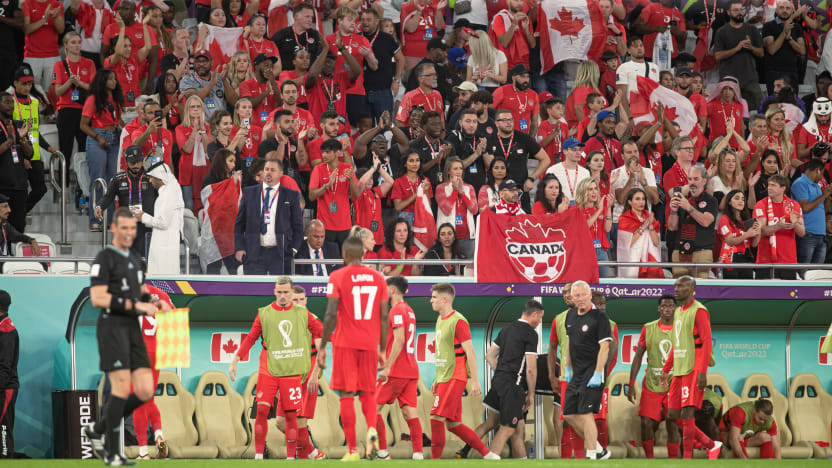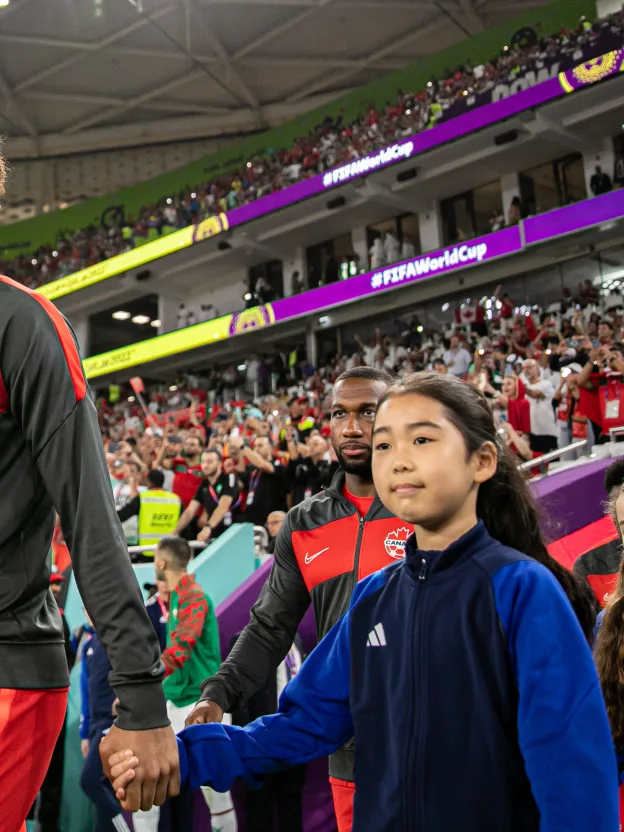As the dust settles on Canada’s return to the men’s World Cup and the tournament carries on without us, there’s time for reflection now at last. It will have been easy in the past fortnight to get caught up in the whirlwind of supporting a team at the World Cup, amid the heartbreak and (ever-so-fleeting) jubilation, the media controversies and the tactical debates. In between all that, I hope you — as I did — found time to soak it in a little bit. Like countless others, my own personal love for the beautiful game began at the World Cup. My proper introduction to the tournament was 2006, watching with my dad as England beat Paraguay 1-0. Four weeks later, fully indoctrinated, my parents abandoned a family camping holiday at the request of an irritating nine-year-old to find a desperately overwhelmed pub in Goderich, Ontario to watch France and Italy in the final. From that moment on, I wanted few things more than to be at those same packed bars with my dad, watching Canada on those same televisions. I wish he could’ve been around to see it, but it finally happened. Three games, three moments when the country paused. Three days when pubs, bars, offices, and school auditoriums around Canada filled up for a couple of hours to watch our men’s national team at the World Cup. For me, and for many others who have watched Canadian soccer for a while, our own little corner of the sport here has always felt quite separate from its quadrennial showcase; the men’s World Cup, where the “big” footballing nations convene every few years, occurred in almost a different universe to ours. Yes, Canada plays against World Cup-bound teams and players all the time in Concacaf, but even that connection to the grand stage didn’t quite compute. At last, we were there, and the whole world watched. None of Canada’s matches went quite the way any of us would have liked, but those few sights and sounds at the start of each of them — seeing the players walk out, hearing the national anthem, watching Atiba Hutchinson shake hands with Eden Hazard — were special. Surely, at least a few tears were shed in those spine-tingling moments, and not just by Kamal Miller. These are players that, less than two years ago, wore that same Canada shirt in empty stadiums in Florida, beginning a journey that took them here. Yes, the group stage was over in a flash — the year-long qualification process wound up in an unceremonious nine-day appearance in Qatar — but that’s part-and-parcel of the World Cup experience. When buying a ticket to a football match, you do so with the understanding that it might go catastrophically wrong for your team. The same is true of the World Cup: You qualify for an opportunity to play, and perhaps lose.

For the past year and a half, the positive emotions around this Canada team have flowed so freely that in some ways we forgot how cruel this sport can be. That sting has, however, returned in full force now. What’s crucial to understand is that, well, sometimes things are like this. Sometimes — often, actually — sports are painful, particularly when they’re a conduit for so much more emotional energy. That said, it’s the heartbreak that makes the brief joys so much sweeter. Consider: Would Canada’s win at San Pedro Sula in January have meant as much without the 8-1 before it? Would beating Mexico be as big a deal if they hadn’t lost to them so routinely for years? Would qualifying for this World Cup have been as special if we hadn’t waited so long? Moments from these three games in Qatar will haunt the Canadian soccer psyche for at least four years, if not longer. But this, unlike qualifying, is not a stage where years of disappointment compound; indeed, many of us (all but one Canadian player, at least) had never seen Canada here. This is not to say Canada was just happy to be there — to the contrary, in fact. This group stage disappointment hurts more because there was genuine hope that this team’s remarkable run might carry it even further. Now that the group stage has ended, though, we Canadians find ourselves among a well-established faction of international soccer fans. We’re not the only ones heartbroken — ask anyone from Uruguay, Germany, or Belgium, all of whom expected far more from this tournament than we did. In the words of Oscar Wilde, though, hearts were made to be broken. I wrote prior to this tournament that Canada were, at last, invited to the party. Now, we’re invited to that morose, reflective after-party that’s been exclusive to 16 teams every four years since 1998. Another 15 disappointed (to varying degrees, of course) teams will join over the next couple of weeks, until the moment on December 18 when just one country lifts a trophy. Pain is just as much a part of the World Cup experience as elation; this is what we signed up for. We’d never tasted quite this flavour of disappointment before, but it’s a bitter one — and we won’t soon forget it. With that in mind, bring on 2026.
